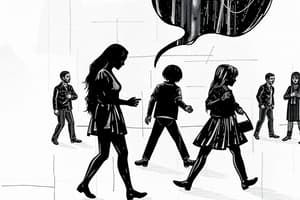Podcast
Questions and Answers
What is internalization?
What is internalization?
The process by which a norm becomes a part of an individual's personality, conditioning that individual to conform to society's expectations.
What are sanctions?
What are sanctions?
The rewards or punishments used to enforce conformity to norms.
What is a positive sanction?
What is a positive sanction?
An action that rewards a particular kind of behavior.
What is a negative sanction?
What is a negative sanction?
What is a formal sanction?
What is a formal sanction?
What is an informal sanction?
What is an informal sanction?
What is social control?
What is social control?
What is deviance?
What is deviance?
What is stigma?
What is stigma?
What is strain theory?
What is strain theory?
What is anomie?
What is anomie?
What is control theory?
What is control theory?
What is cultural transmission theory?
What is cultural transmission theory?
What is differential association?
What is differential association?
What is labeling theory?
What is labeling theory?
What is primary deviance?
What is primary deviance?
What is secondary deviance?
What is secondary deviance?
What is crime?
What is crime?
What is white collar crime?
What is white collar crime?
What is a crime syndicate?
What is a crime syndicate?
What is the criminal justice system?
What is the criminal justice system?
What is police discretion?
What is police discretion?
What is racial profiling?
What is racial profiling?
What is plea bargaining?
What is plea bargaining?
What are corrections?
What are corrections?
What is recidivism?
What is recidivism?
Flashcards are hidden until you start studying
Study Notes
Key Concepts in Social Control and Deviance
- Internalization: Integrating societal norms into one’s personality, leading to voluntary conformity.
- Sanctions: Mechanisms (rewards or punishments) that promote adherence to social norms, influencing behavior.
Types of Sanctions
- Positive Sanction: A reward that reinforces desired behavior, encouraging repetition.
- Negative Sanction: A punitive measure or threat that discourages deviant actions.
Forms of Sanctions
- Formal Sanction: Official rewards or punishments issued by institutions like schools or government entities.
- Informal Sanction: Unofficial expressions of approval or disapproval from individuals or groups, reflecting societal attitudes.
Social Control and Deviance
- Social Control: The means by which society enforces conformity, utilizing both internal (personal) and external (societal) mechanisms.
- Deviance: Behavior that transgresses established social norms and expectations, challenging societal order.
Stigma and Its Effects
- Stigma: A social label that distinguishes individuals as deviant, often leading to discrimination and exclusion from societal acceptance.
Theories of Deviant Behavior
- Strain Theory: Proposes that deviance arises as a natural result of societal values and structures that create pressure and limitations.
- Anomie: A state characterized by a breakdown of societal norms, leading to confusion and disconnection.
- Control Theory: Suggests that deviant behavior is inherent, and conformity is maintained through social bonds and connections.
- Cultural Transmission Theory: Argues that deviance is learned through interactions and cultural influences.
- Differential Association: Highlights the impact of close relationships with deviant versus non-deviant peers on individual behavior.
- Labeling Theory: Focuses on how societal labels transform an individual’s self-identity and perception as deviant.
Types of Deviance
- Primary Deviance: Minor norm violations that are not perceived as deviant by the individual or society.
- Secondary Deviance: Engagement in a deviant lifestyle and acceptance of the deviant label as part of one’s identity.
Crime and Criminal Behavior
- Crime: Actions defined as illegal by authorities, subject to legal penalties.
- White Collar Crime: Non-violent crimes committed for financial gain by individuals in high social positions.
- Crime Syndicate: A powerful organization of criminals conducting illegal activities, often through intimidation or violence.
Criminal Justice System
- Criminal Justice System: The interconnected system comprising police, courts, and corrections, which processes criminal acts.
- Police Discretion: Officers' authority to decide who gets arrested, leading to variability in enforcement.
- Racial Profiling: Discriminatory practice of targeting individuals based on race instead of evidence or behavior.
Legal Processes
- Plea Bargaining: An agreement in which defendants plead guilty to lesser charges, often in exchange for reduced sentences.
- Corrections: The array of sanctions imposed to punish and rehabilitate criminals.
- Recidivism: The phenomenon where former criminals re-offend, highlighting challenges in rehabilitation and social reintegration.
Studying That Suits You
Use AI to generate personalized quizzes and flashcards to suit your learning preferences.





